MercoPress. South Atlantic News Agency
Tag: Scioli-Macri ballotage 2015
-
Tuesday, September 24th 2019 - 09:26 UTC
Argentina Needs Intensive Care
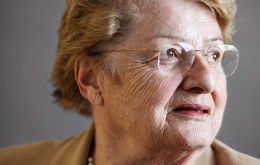
By Anne Krueger (*) - Argentina's President Mauricio Macri knew that he had inherited a sick economy when he took office in 2015, but failed to take his medicine. As a result, the country now has no choice but to face up to a period of painful structural adjustment.
-
Wednesday, January 27th 2016 - 06:42 UTC
Parlasur could invite Falklanders', but first Macri must cracks the “chavista axis”
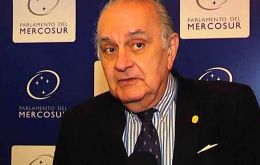
The Argentine representation in the Mercosur parliament, Parlasur, is considering inviting a group of 'kelpers' Falklands/Malvinas lawmakers, 'to listen to their needs and promote cooperation, but in the framework of Argentina's unrenounceable sovereignty claim over the Islands'.
-
Friday, January 22nd 2016 - 04:33 UTC
UK position on Falklands remains as expressed by 2013 referendum, Cameron tells Macri
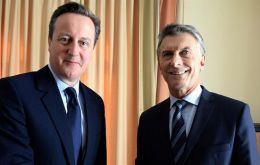
The United Kingdom government has released a statement pointing out the “three areas” British Prime Minister David Cameron and President Mauricio Macri “covered” during their Davos meeting on Thursday.
-
Friday, January 22nd 2016 - 04:15 UTC
US announced support for Argentina at multilateral development banks
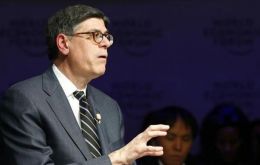
The United States is ending its policy of opposing most lending to Argentina from multilateral development banks, the US Treasury Department announced. US Treasury Secretary Jack Lew informed Argentine Finance Minister Alfonso Prat-Gay of the move on Thursday when the two met in Davos, Switzerland, the department said in a statement.
-
Tuesday, December 1st 2015 - 07:40 UTC
Macri's victory was narrower than expected, according to the final vote count
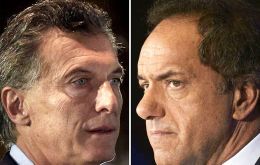
Argentina’s conservative, business-friendly president-elect Mauricio Macri won the presidential election earlier this month with 51.34% of the vote, according to final results released Monday. His rival, incumbent Daniel Scioli, finished with 48.66% percent, said the head of the national electoral authority, Alejandro Tullio.
-
Monday, November 23rd 2015 - 07:40 UTC
“Change is possible, thanks for believing”, president elect Macri´s first words
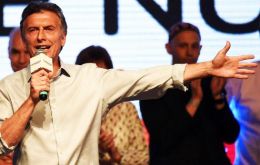
“Change is possible, thanks so much for having believed”, were the first words of Argentine president-elect Mauricio Macri when he appeared on stage at his packed headquarters in Buenos Aires, Sunday evening. Visibly emotional and euphoric, Macri said “it is a historic day for Argentina, a change of times. A change that will guide us to the future”.
-
Monday, November 23rd 2015 - 07:16 UTC
Argentine president-elect Macri takes office on 10 December; Tuesday meeting with Cristina Fernandez
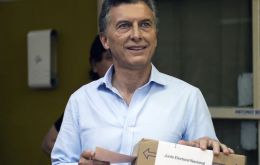
Mauricio Macri is Argentina's next president following the results of Sunday's runoff, the first in Argentine history. He will take office on 10 December replacing president Cristina Fernandez and twelve years of uninterrupted Kirchnerism. Although definitive results are yet to be announced by electoral officials, the primary vote counting indicated that Macri was winning with a four percentage points over incumbent Daniel Scioli.
-
Saturday, November 21st 2015 - 08:48 UTC
Macri honors 'Pachamama' and Scioli bewares 'the savage capitalism demon' on closing election rallies
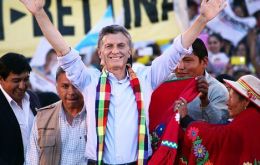
Argentine presidential opposition candidate Mauricio Macri closed his campaign ahead of Sunday 22 November runoff calling for change and unity while the incumbent hopeful Daniel Scioli said the option was between 'a development inclusive project' or the “savage capitalism demon”.
-
Thursday, November 19th 2015 - 07:37 UTC
Scioli's burden: Kirchnerism and Macri's, his rich family background

What are the main drawbacks of the Argentine presidential candidates, ahead of 22 November runoff and following their exposure in last Sunday's debate, is the question a Buenos Aires pollster has tried to unveil, and how much could they in effect influence Sunday's vote.
-
Thursday, November 19th 2015 - 07:27 UTC
Argentina: Massa “believes Macri wins”, but Scioli is “still fighting and much alive”

Sergio Massa, the third contender in the Argentine presidential dispute and who did not make it to the runoff last 25 October, but managed 21% of ballots, some five million votes, compared to incumbent Daniel Scioli's 37% and Mauricio Macri's 34%, has been very careful in advancing whom he would support or recommend to vote on Sunday 22 November.
